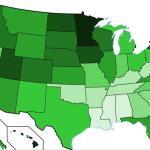I have written about attempts to eat our way to health through more nutritious diets.
longevity
Let me begin with the caveats – it is a research study of the UK Biobank, which in the authors' words, “is not fully representative of the UK population regarding lifestyle and characteristics.” Ninety-four percent+ of the participants
Now there is no argument for the need of communities to improve their public space infrastructure to allow for the availability of parks, bike lanes, walking paths, smoking policies, faith-based organizations, improved educational efforts, etc., a
The public forum is dominated by discussions surrounding access to medical care. In part, calls for expanded “health care” abound with the term often a misnomer.
You know the memes sixty-five is the new 50 or 40, depends on what you might be considering.
A few weeks ago, the media ran wild with an outlandish claim that an extra glass of wine will take 30 minutes off of your life.
Today, the political and media landscapes seem laser-focused on polarized, wide brush policy no matter the context. You don’t need to look very far to appreciate this reality.
You best get your drink on this week, while beer and wine consumption is good for you!
If anyone embodies the ideals of healthy living and longevity, it appears there's no one better suited for the role than Robert Marchand.











